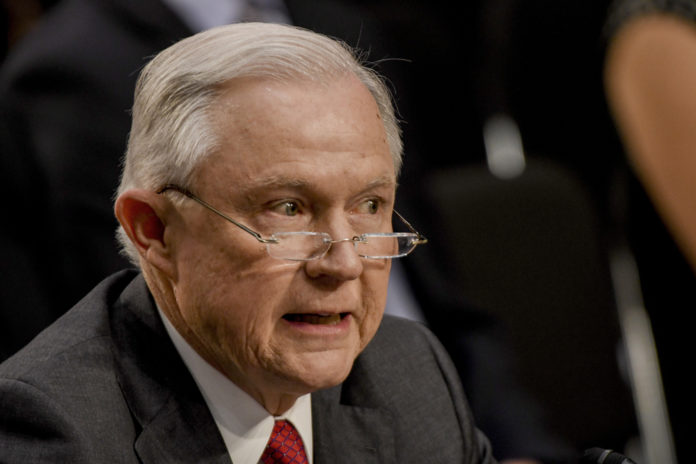The attorney general reinforced the ‘Holder-Lynch’ policy of federal restraint with states that legalize medical cannabis.
WASHINGTON, D.C. – During a hearing of the House Judiciary Committee Tuesday, United States Attorney General Jeff Sessions was asked to comment on current federal policy regarding cannabis as well as derogatory comments about people who consume cannabis that he has made in the past.
The first comment came in response to a question from Rep. Steve Chabot, a Republican from Ohio, who asked Sessions to clarify the DoJ’s position on enforcing federal law, which still outlaws cannabis as a Schedule 1 drug under the Controlled Substances Act, even though “a number of states for both medical purposes and now recreational purposes have basically make it legal.”
“What is your policy on that relative to enforcing the law?” Chabot asked Sessions.
“Our policy, really, is the same as the Holder-Lynch policy, which is that the federal law remains in effect, and a state can legalize marijuana for its law enforcement purposes, but it still remains illegal with regard to federal purposes,” replied Sessions, referring to the “Cole Memo,” the 2013 policy authored by then-Deputy Attorney General James M. Cole that set guidelines by which states could establish medical cannabis programs that would not trigger federal intervention.
“It seems to me that there has always been a tremendous amount of gray area in that whole field which I think as a nation we need to look much more closely at, both from the state’s point of view and from the federal government point of view. That’s just my feeling on that.”
Five questioners later, Democrat Steve Cohen from Tennessee furthered the line of questioning. “You said you are basically doing the same as Holder and Lynch,” he prefaced. “I believe General Holder and General Lynch abided by congressional appropriations that limited the Justice Department enforcing marijuana laws in states had passed laws on medical marijuana and others. Will you abide by congressional appropriations limitations on marijuana when it conflicts with state laws?
“I believe we are bound by that,” answered Sessions, referring to the Rohrabacher-Blumenauer amendment.
Following an exchange on DoJ policy on crack cocaine, Cohen asked Sessions, “Marijuana is not as dangerous as heroin; do you agree with that?”
“I think that’s correct,” replied the AG.
“Thank you, sir,” responded Cohen, before launching into a spirited account of the benefits of state-run cannabis programs. “I would hope that in your enforcement that you would look at the limitations you’ve got. There’s always an opportunity cost, and put your opportunity cost, your enforcement, on crack, on cocaine, on meth, on opioids, and on heroin. Marijuana is the least bothersome of all.
“29 states and the District of Columbia have legalized it for medical purposes, and eight states and the District of Columbia for recreational purposes,” he added. “Justice Brandeis once famously said that the states are the laboratories of democracy. I would hope that you would look at marijuana and at the states as the laboratories of democracy, and see how they’ve helped.
“In states where they have got medical marijuana,” continued Cohen, “they have 25 percent less opioid use. It gives people a way to relieve pain without using opioids, which inevitably leads to death and crime. And so, I would hope that you would take a look at that.”
“We will take a look at it,” said Sessions, adding somewhat ominously. “We will be looking at some rigorous analysis of the marijuana usage and how it plays out. I’m not as optimistic as you.”
Cohen immediately followed with another cannabis-related question directed at Session’s negative depiction of people who consume at a past hearing. “You said at one time that good people don’t smoke marijuana. Which of these people are not good people,” he asked.
“Well, let me explain how that occurred,” interjected Sessions.
“Alright. Quickly,” said Cohen, adding, “Is John Kasich a good person? George Pataki, Rick Santorum, Newt Gingrich, Ted Cruz, Jeb Bush, George Bush, Arnold Schwarzenegger, and Judge Clarence Thomas? Which of those are not good people?”
“Let me tell you how that came about, congressman,” continued a miffed Sessions. “The question was what do you do about drug use, the epidemic we’re seeing in the country, and how do you reverse it. Part of that is a cultural thing. I explained how when I became a United States Attorney in 1981, and the drugs were being used widely, over a period of years it became unfashionable, unpopular, and it was seen as such that good people didn’t use marijuana. That was the context of that statement.”
Cohen wanted to continue, perhaps to dispute the accuracy of Sessions’s recollection of the success of Nancy Reagan’s contribution to the War on Drugs, but his time was up.











